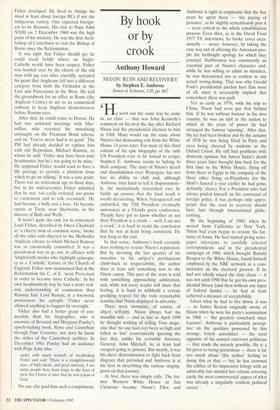By hook or by crook
Anthony Howard
NIXON: RUIN AND RECOVERY by Stephen E. Ambrose Simon & Schuster, £20, pp. 667 He went out the same way he came in, no class' — that was John Kennedy's comment on his rival the day after Richard Nixon lost the presidential election to him in 1960. Many would say the same about Nixon's last demeaning exit from the White House 14 years later. For most of this third volume of his epic biography of the only US President ever to be forced to resign, Stephen E. Ambrose seems to belong to their company. The story of Nixon's deceit and dissimulation over Watergate has not lost its ability to chill and, although Ambrose tries hard to tell it dispassionate- ly, the meticulously researched case he builds up ensures that the final result is totally devastating. When, beleaguered and embattled, the 37th President eventually announces at a Florida press conference, 'People have got to know whether or not their President is a crook — well, I am not a crook', it is hard to resist the conclusion that he was at least being consistent. He was lying to the end.
In that sense, Ambrose's book certainly does nothing to restore Nixon's reputation. But by devoting the last quarter of his narrative to his subject's pertinacious climb-back to respectability, the author does at least add something new to the Nixon canon. This part of the story is told with something approaching admiration, and, while not every reader will share that feeling, it is hard to withhold a certain grudging respect for the truly remarkable stamina that Nixon displayed in adversity.
There were moments, of course, of abject self-pity. Nixon always had his maudlin side — and as late as April 1990 he thought nothing of telling Time maga- zine that `no one had ever been so high and fallen so low' (conveniently ignoring the fact that, unlike his erstwhile Attorney General, John Mitchell, he at least had escaped going to prison). But mostly, it was his sheer determination to fight back from disgrace that prevailed and Ambrose is at his best in describing the various staging- posts on that journey.
At first, there was simply exile. The for- mer Western White House at San Clemente became Nixon's Elba; and Ambrose is right to emphasise that the five years he spent there — 'the paying of penance', as he slightly sententiously puts it — were critical to the whole rehabilitation process. Even then, as in the David Frost 1977 TV interviews, he broke cover occa- sionally — never, however, by taking the easy way out of offering the American peo- ple the forthright apology for which they yearned. Stubborness was consistently an essential part of Nixon's character and, while he was willing to admit to mistakes, he was determined not to confess to any actual wrong-doing. That was why Gerald Ford's presidential pardon hurt him most of all, since it necessarily implied that somewhere there was guilt.
Yet as early as 1976, with his trip to China, Nixon had even put that behind him. If he was without honour in his own country, he was an idol in the nation to which in his years of power he had arranged the famous 'opening'. After that, the ice had been broken and by the autumn of 1978 he was being feted in Paris and even being cheered by students in the Oxford Union. He still had problems with domestic opinion, but Anwar Sadat's death three years later brought him back for the first time to the White House, flying off from there to Egypt in the company of the three other living ex-Presidents (to the Shah's funeral a year earlier he had gone, defiantly, alone). For a President who had always prided himself on his command of foreign policy, it was perhaps only appro- priate that the road to recovery should have lain through international globe- trotting.
By the beginning of 1980, when he moved from California to New York, Nixon had even begun to restore his for- tunes at home. He had started giving news- paper interviews to carefully selected correspondents and in the presidential campaign of 1980, which brought Ronald Reagan to the White House, found himself employed by the NBC network as a com- mentator on the electoral process. If he had not wholly wiped the slate clean — it was not until 1990 that he got his own pres- idential library (and then without any input of federal funds) — he had at least achieved a measure of acceptability.
Given what he had to live down, it was — as James Reston originally wrote of Nixon when he won his party's nomination in 1968 — 'the greatest comeback since Lazarus'. Ambrose is particularly percep- tive on the qualities possessed by this strange, lonely autodidact — the total opposite of the normal extrovert politician — that made the miracle possible. He is a bit given to being portentous — there is far too much about 'this author' feeling or doing this or that — but he has crowned the edifice of his impressive trilogy with an admirably fair-minded last xolume covering easily the most controversial aspect of what was already a singularly resilient political career.


















































 Previous page
Previous page